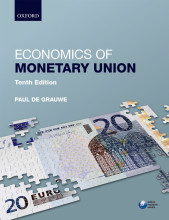Fiscal policies in monetary unions
6 important questions on Fiscal policies in monetary unions
How do fiscal policies in MU reduce fragility?
Without a centralized government budget, the French government budget deficit increases.
How does the theory of OCAs affect fiscal policies in MUs?
2. if such a centralization of the national government budgets in a MU is not possible, then national fiscal policies should be used in a flexible way. That is, when countries are hit by a shock, they should be allowed to let the budget deficit increase
Fiscal policy is only policy left when entering a MU
Explain the sustainability problem of government budget deficits
- Higher grades + faster learning
- Never study anything twice
- 100% sure, 100% understanding
Name three aspects of the Stability and Growth Pact that show the sustainability principles
2. countries with budget deficits over 3% will be subject to fines
3. fines will not be applied if the countries in question experience circumstances such as natural disasters
Why may risk of default increase in a MU?
In a MU, a country cannot create surprise inflation and devaluation (no own currency anymore) > pressure on the government to organize outright default may increase
In MU: liquidity crises easily > solvency crises: since CB can raise the interest rates to such high levels that government find themselves unable to service their debt
Explain how a joint issue of common bonds work and what problems might arise
problems:
- creates incentive for countries to rely on this insurance and issue too much debt (moral hazard)
- countries with a better debt rating have to pay higher interest rate on their debt
> tackle by different type of bonds:
blue bonds: for those with debt level up to 60% of GDP - low r
red bonds: for levels of debt above 60% of GDP - high r
The question on the page originate from the summary of the following study material:
- A unique study and practice tool
- Never study anything twice again
- Get the grades you hope for
- 100% sure, 100% understanding






























